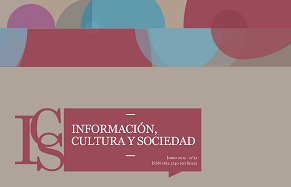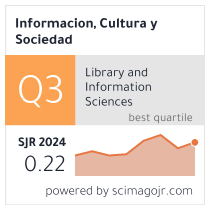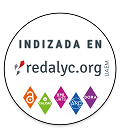Active participation in classes. Factors that intervene in the interaction of students in synchronous online clases
Abstract
Students participation is vital in the teaching - learning processes, acquiring greater relevance in virtual learning environments. However, in online class experiences it has been shown that there is low interaction during synchronous classes, between students and teacher, and among students themselves. Therefore, the purpose of this study is to identify the factors that intervene in the interaction of the Library Science and Documentation students, of the Universidad Tecnológica Metropolitana, in synchronous online classes. A survey with open and closed questions was used as a data collection instrument, applied to a sample of 103 regular students of the career, from a universe of 155 students. The results showed that the active participation of students in synchronous online classes is affected by factors internal and external to the learner, including personal, motivational and environmental aspects.Downloads
References
Cea, Fredy, Ricardo A. García Hormazábal, Héctor Turra Chico, Beatriz Moya Figueroa, Sergio Sanhueza Jara, Rodrigo Moya Sobarzo y Wilma A. Vidal Hernández. 2020. Educación online de emergencia: Hablando a pantallas en negro. En Ciper: Ciper Académico. 08 de junio de 2020 . < https://www.ciperchile.cl/2020/06/08/educacion-online-de-emergencia-hablando-a-pantallas-en-negro/> [Consulta: 29 abril 2021].
Chaves Torres, Anívar Néstor. 2017. La educación a distancia como respuesta a las necesidades educativas del siglo XXI. En Revista Academia y Virtualidad. Vol. 10, no. 1, 23-41.<https://doi.org/10.18359/ravi.2241>
Flores López, Olivers. 2015. La participación de los estudiantes en el aula como factor determinante para mejorar la calidad de los aprendizajes. Santiago de Chile: Universidad Alberto Hurtado. Tesis de Magíster. < https://repositorio.uahurtado.cl/bitstream/handle/11242/7873/MGDEFloresL.pdf?sequence=1&isAllowed=y > [Consulta: 27 abril 2021].
Guevara Bazán, Isaí Alí. 2011. La interacción en el aprendizaje. En Revista de divulgación científica y tecnológica de la universidad veracruzana. Vol. 24, no. 1. <https://www.uv.mx/cienciahombre/revistae/vol24num1/articulos/interaccion/ > [Consulta: 29 abril 2021].
Hernández-Sampieri, Roberto, Carlos Fernández Collado y Pilar Baptista Lucio. 2010. Metodología de la investigación. 6a ed. México: McGraw-Hill.
Hiltz, Starr Roxanne, Nancy Coppola, Naomi Rotter, Murray Turoff y Raquel Benbunan-Fich. 2000. Measuring the importance of collaborative learning for the effectiveness of ALN: A multi-measure, multi-method approach. En Online Learning. Vol. 4, no. 2, 103-125. <https://doi.org/10.24059/olj.v4i2.1904 >
Hrastinski, Stefan. 2009. A Theory of online learning as online participation. En Computers & Education. Vol. 52, no. 1, 78-82. <https://doi.org/10.1016/j.compedu.2008.06.009>
Jin, Sung-Hee. 2017. Using Visualization to Motivate Student Participation in Collaborative Online Learning Environments. En Educational Technology & Society. Vol. 20, no. 2, 51–62.< https://www.semanticscholar.org/paper/Using-Visualization-to-Motivate-Student-in-Online-Jin/5a199919b75b96e578d8fd864adafe65513d10db > [Consulta: 25 abril 2021].
Lepp, Andrew, Jacob E. Barkley, Aryn C. Karpinski y Shweta Singh. 2019. College Students’ Multitasking Behavior in Online Versus Face-to-Face Courses. En Sage Open. Vol. 9, no. 1, 1-9. <https://doi.org/10.1177/2158244018824505>
López, Marielsa, Mariano Herrera y Diego Apolo. 2021. Educación de calidad y pandemia: retos, experiencias y propuestas desde estudiantes en formación docente de Ecuador. En Texto Livre: Linguagem e Tecnología. Vol. 14, no. 2. <https://doi.org/10.35699/1983-3652.2021.33991>
Mac-Ginty, Scarlett, Álvaro Jiménez-Molina y Vania Martínez. 2021. Impacto de la pandemia por COVID-19 en la salud mental de estudiantes universitarios en Chile. En Revista chilena de psiquiatría y neurología de la infancia y adolescencia. Vol. 32, no. 1, 23-37. <https://www.imhay.org/wp-content/uploads/2021/03/Rev-SOPNIA-2021_Impacto-de-la-pandemia-por-COVID-19-en-la-salud-mental-de-estudiantes-universitarios-en-Chile.pdf >[Consulta: 23 enero 2021].
Nieuwoudt, Johanna Elizabeth. 2020. Investigating synchronous and asynchronous class attendance as predictors of academic success in online education. En Australasian Journal of Educational Technology. Vol. 36, no. 3, 15-25. <https://doi.org/10.14742/ajet.5137>
Ortiz Alonso, Pablo Efraín, Nancy Fátima González de Ruíz, Rides Dejesús Núñez Ortellado y Ángela Graciela Insfrán de Rodríguez. 2021. Elementos distractores en el proceso de enseñanza aprendizaje virtual, en los alumnos del segundo curso de la carrera de Psicología y Ciencias de la Educación, Facultad de Filosofía, Filial San Estanislao, año 2021. En Revista científica de la Facultad de Filosofía. Vol. 13 no. 2, 115-128. <http://www.fil.una.py/investigacion/index_files/2021.2/pabloEfrainOrtizAlonso-et-al-2021-2.pdf> [Consulta: 23 enero 2021].
Ozaydın Ozkara, Betül y Hasan Cakir. 2018. Participation in online courses from the students’ perspective. En Interactive Learning Environments. Vol. 26, no. 7.<https://doi.org/10.1080/10494820.2017.1421562>
Paredes, Elizabeth. 2010. Factores que afectan la participación de los estudiantes a distancia de la Universidad Rafael Belloso Chacín. En Revista electrónica de humanidades, educación y comunicación social. Vol. 5, no. 8, 63-81. <https://dialnet.unirioja.es/servlet/articulo?codigo=3167969 > [Consulta: 02 mayo 2021].
Rodríguez Pintor, Juana y Liliana Caso de Palá. 2000. El dilema de la participación en la enseñanza universitaria. <https://core.ac.uk/reader/95052222> [Consulta: 07 mayo 2021].
Rodríguez-Valerio, Daniela. 2021. Docencia universitaria en medio del Covid-19. Adaptación y desarrollo de un curso de Bibliotecología en la virtualidad. En Información, cultura y sociedad. Vol. 44, 155-174. <https://doi.org/10.34096/ics.i44.9818>
Wenger, Etienne. 1998. Communities of Practice: Learning, Meaning, and Identity. Cambridge: Cambridge University Press. <https://doi.org/10.1017/CBO9780511803932>
Authors publishing in this journal acknowledge the conditions below:
- Authors retain the copyright of their work while they transfer the right of the first publishing to the journal, under the Creative Commons Attribution-ShareAlike 4.0 International (CC BY-SA 4.0) Licence, which allows third parties to reproduce them under the condition that express mention is given to the author and to its original publication in the journal.
- Authors may enter into other contractual and independent arrangements for the non-exclusive distribution of the version of the article published in this journal (for instance, it can be published in an institutional repository or in a book). In any case, an express mention should be given to its first publication in the journal.
- It is permitted and encouraged to publish online the articles (for example, on institutional or personal pages).


























